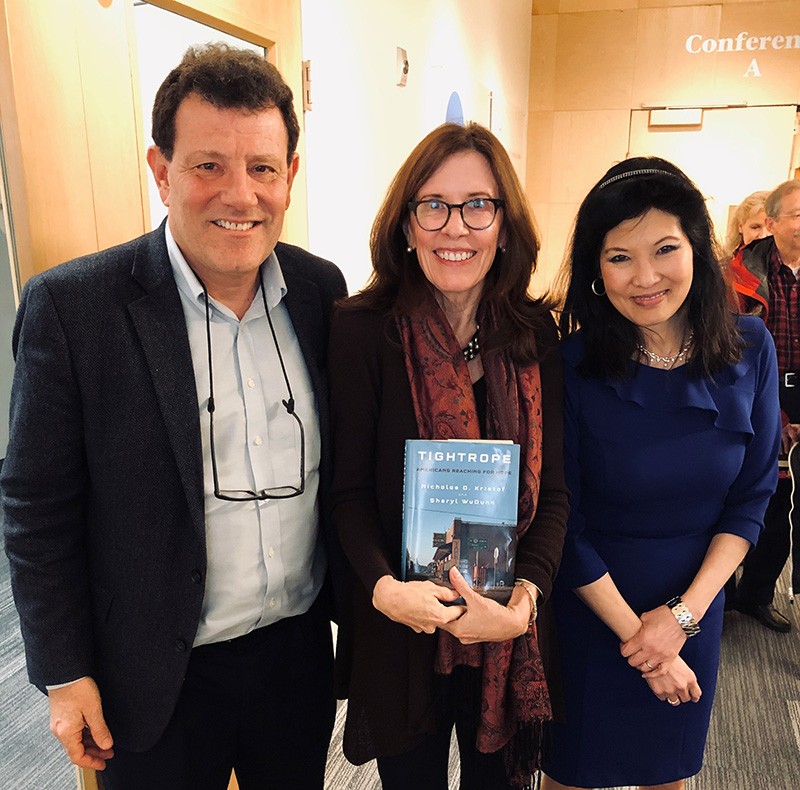
Our ability to expand fistula care to more women in more countries is directly related to our ability to reach more donors like you. Once people learn about the needless suffering that afflicts so many women with fistula across Africa and Asia, they are highly inclined to do something about it. But reaching them is a constant struggle, and a core part of our mission. It’s a busy world in which people lead busy lives, and—let’s face it—fistula isn’t an easy subject to talk about. So we depend on a wide range of “ambassadors” who, largely out of their own sense of commitment, step up and spread the word.
Few people have served more effectively in that ambassadorial role than Nick Kristof, the renowned reporter and columnist for The New York Times. Last week, the Times announced that Nick will be leaving the paper so that he can engage in other pursuits. All signs point to a run to become the next governor of Oregon, his native state. If he succeeds in that effort, it will be Oregon’s gain. But the cause of global women’s health will lose—if only temporarily—a trusted and powerful voice.
I wish the very best for Nick in his next endeavor, and I want to honor the legacy that he has created for all of us who care about fistula awareness and fistula treatment.
Nick’s most enduring contribution to the field arguably came in the landmark book Half the Sky: Turning Oppression Into Opportunity for Women Worldwide (2009), wriitten with his wife and coauthor Sheryl WuDunn. That book, in combination with the PBS documentary of the same name, introduced a wide audience to the problem of fistula and highlighted the role that fistula treatment must play in the struggle for global women’s empowerment.
But Nick, a two-time Pulitzer Prize recipient (once for reporting and once for commentary), has long used his platform to focus attention on fistula.
Back in 2003, Nick extolled the work of Dr. Catherine Hamlin, the legendary surgeon who spent decades treating women at the Fistula Hospital in Addis Ababa, Ethiopia. In vivid, searing language, Nick evoked the heartbreak of the condition that Dr. Hamlin devoted her life to treating:
“She has helped 24,000 women overcome obstetric fistulas, a condition almost unknown in the West but indescribably hideous for millions of sufferers in the poorest countries in the world. … Women with fistulas stink and leave a trail of urine behind them. They are often abandoned by their husbands and driven out by other villagers.”
Nick is as passionate about discussing solutions as he is about describing problems. In 2009, the year that we at Fistula Foundation launched our global strategy, he gave us a welcome nod in a column titled “A Most Meaningful Gift Idea.” He noted that we are “dedicated to correcting a childbirth injury that is one of the worst things that can happen to a person” and emphasized the value that we deliver: “A $450 surgical repair can usually solve the problem and give these young women their lives back. For fistula sufferers, it’s truly the gift of a lifetime.” (The average cost of fistula surgery is now $586, but Nick’s point holds true today.)
In 2018, Nick gave us another shout-out, this time in a piece titled “How to Make the World a Better Place.” He wrote:
“The [Fistula] Foundation has supported fistula surgeries in many parts of the world, restoring hope to women and girls who thought that their lives were essentially over. I’ve never seen a smile to match that of a teenage girl whose fistula has been repaired, who has her life back.”
I could go on and on. Over the two decades that he served as a New York Times columnist, Nick persistently found occasion to alert his readers to the plight of women with fistula—and to the promise of curing them through life-transforming surgery. Almost single-handedly, he made the discussion of fistula “fit to print” in the world of mainstream American media.
As Nick turns his attention to domestic U.S. issues, we will miss his bold reporting on issues related to women’s global health. But we will never forget the impact of that work.
Yours in gratitude,
Kate Grant
CEO, Fistula Foundation